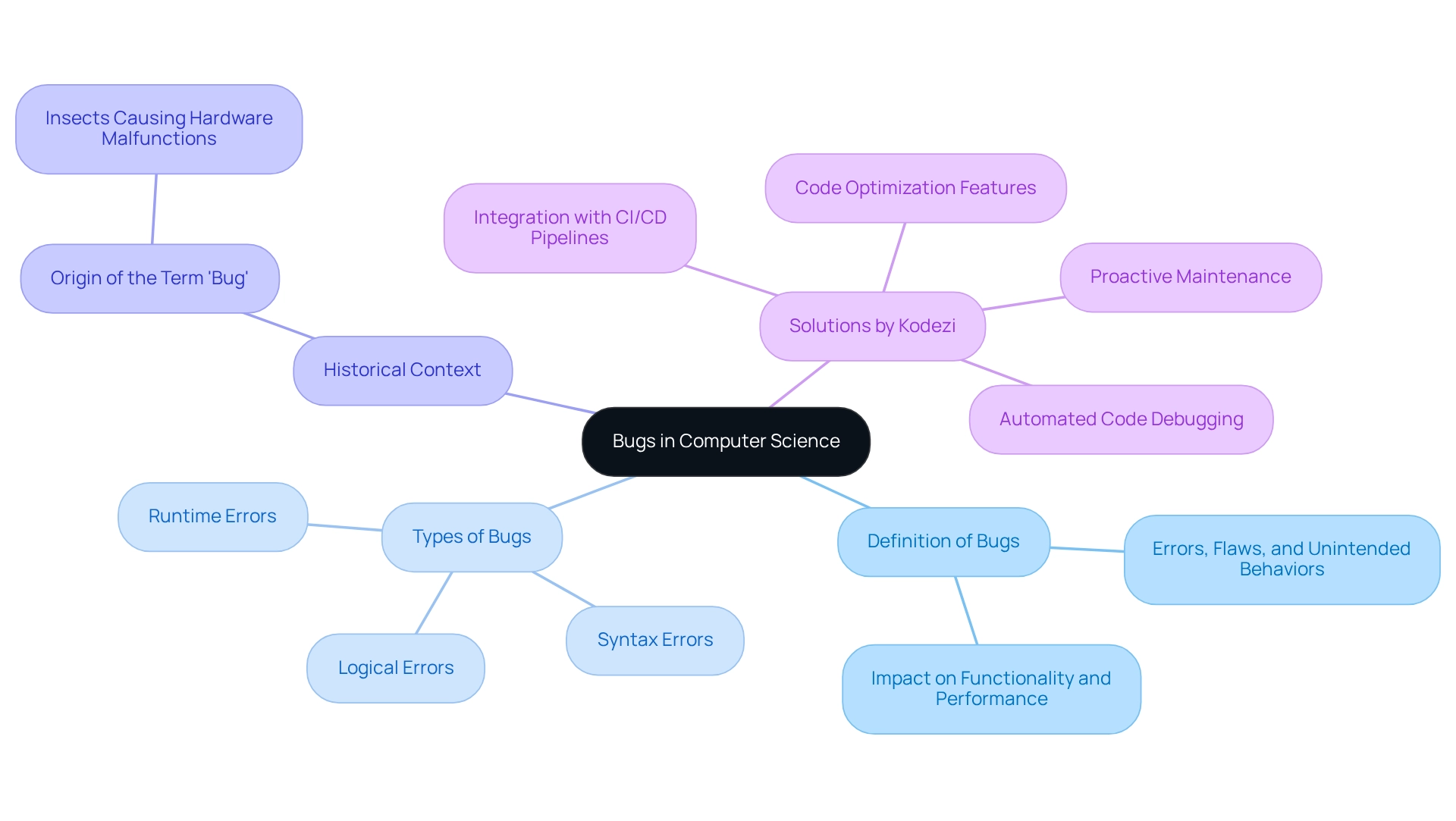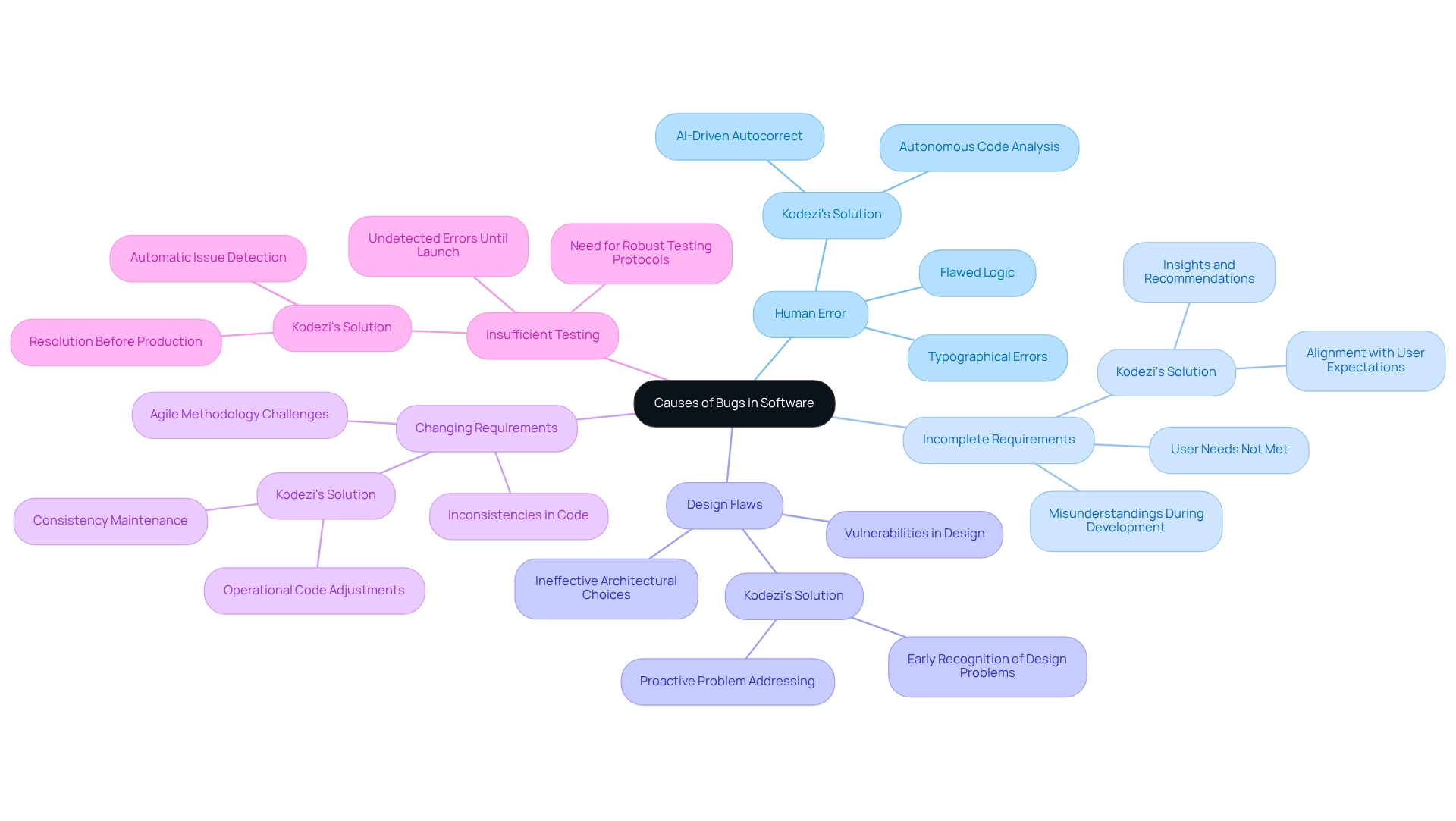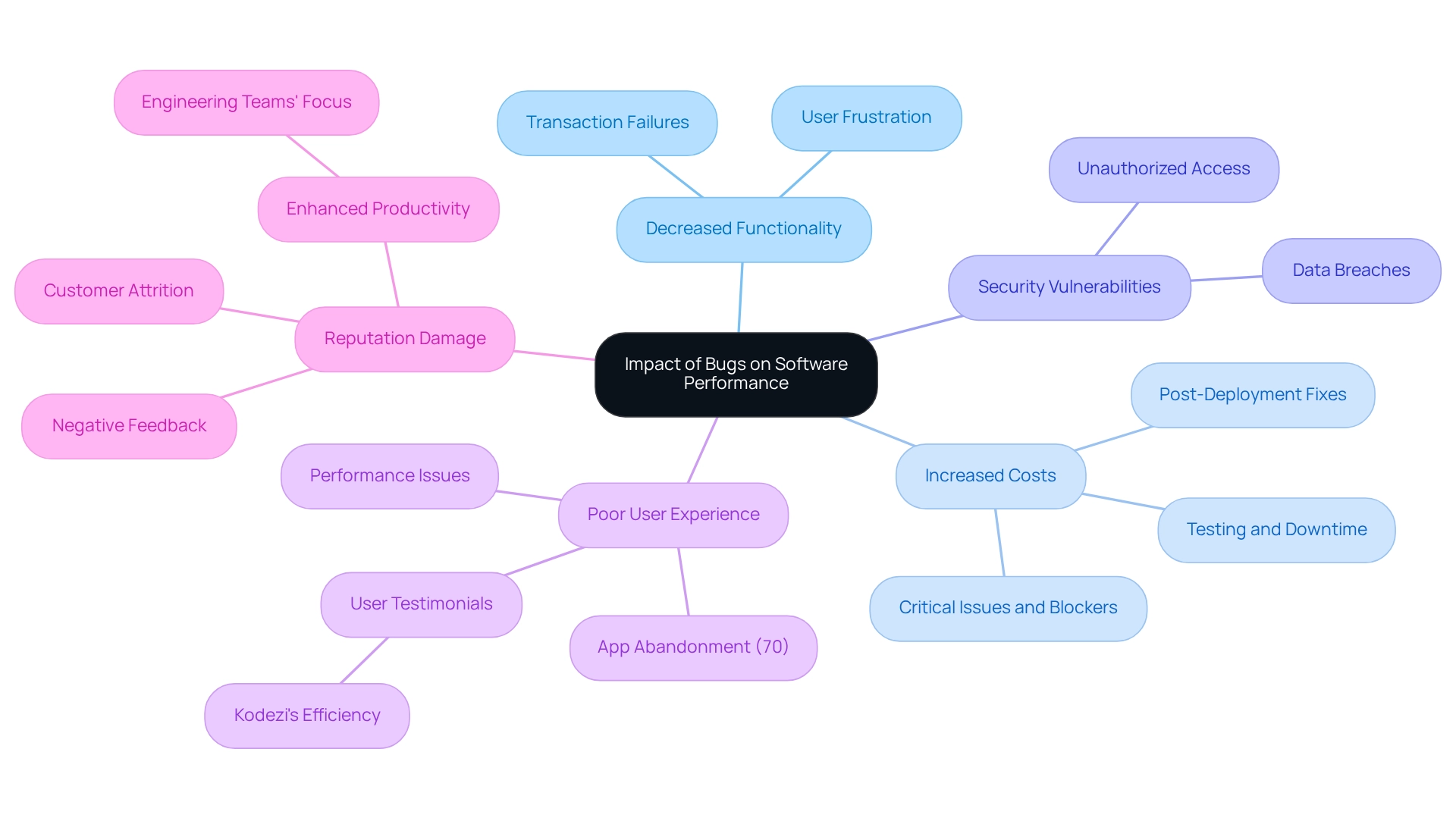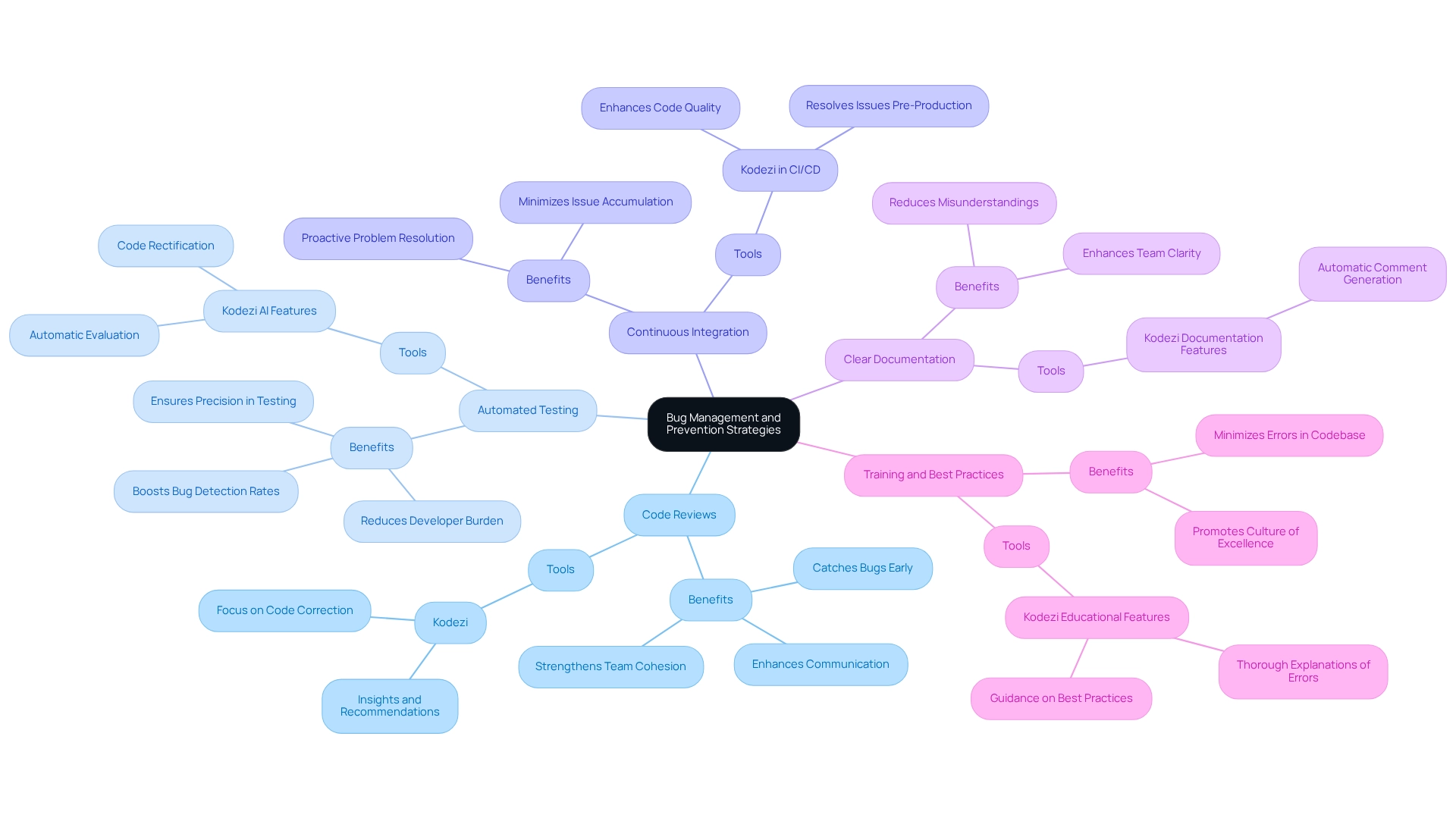Overview
In the world of software development, coding challenges are a common hurdle that developers face. Software bugs—errors or unintended behaviors in programs—can significantly impact functionality, user experience, and overall software quality. Understanding the various types of bugs and their causes, such as human error and incomplete requirements, is crucial for effective development.
So, how does Kodezi help tackle these challenges? Kodezi offers automated bug detection and resolution tools that enhance code quality and improve development efficiency. By streamlining the debugging process, Kodezi allows developers to focus on what truly matters: creating robust software.
Imagine the benefits of using Kodezi—improved productivity and higher code quality. With its user-friendly features, developers can quickly identify and fix bugs, resulting in a smoother coding experience. Furthermore, Kodezi empowers teams to deliver better products in less time.
Are you ready to elevate your coding practices? Explore the tools available on the Kodezi platform and experience the difference for yourself. By leveraging Kodezi, you can transform how you approach software development, ensuring that bugs are a thing of the past.
Introduction
In the intricate world of software development, coding challenges can significantly undermine functionality and user trust. Bugs, ranging from simple typographical errors to complex logical flaws, often arise from human oversight and design missteps. Furthermore, the historical roots of the term "bug" harken back to a time when actual insects disrupted machinery. Today, however, the challenge lies in maintaining software quality amid rapid technological advancement.
As engineering teams grapple with the implications of software bugs—such as increased costs and security vulnerabilities—tools like Kodezi CLI are revolutionizing the approach to debugging and optimization. Kodezi automates the identification and resolution of bugs, streamlining the debugging process. In addition, it enhances productivity, making it an essential ally in the quest for robust software solutions.
Imagine the impact of improved code quality on your projects. By leveraging Kodezi, developers can not only safeguard user experience but also increase their efficiency dramatically. Why not explore the tools available on the platform and see how they can transform your coding practices? With Kodezi, tackling the complexities of software development becomes a more manageable endeavor.
Define Bug in Computer Science
In computer science, developers frequently encounter various coding challenges, including the presence of bugs, which align with the bug definition computer that describes them as errors, flaws, or unintended behaviors within a program that lead to incorrect or unexpected results. Bugs manifest in multiple forms, including syntax errors, logical errors, and runtime errors, each impacting the application's functionality and performance in distinct ways. The term 'bug' carries historical significance, originating from the early days of computing when actual insects were discovered causing malfunctions in hardware. This anecdote highlights the ongoing challenge of maintaining quality in applications.
Furthermore, Kodezi effectively addresses these coding challenges by providing automated code debugging and optimization features. It identifies and resolves bugs efficiently, ensuring that code remains clean and compliant. By understanding the various categories of software bugs—ranging from minor typographical mistakes to intricate logical errors—engineering teams can significantly enhance their productivity and code quality. In addition, Kodezi's tools empower developers to focus on creating reliable applications, ultimately improving user experience and system reliability.
As Shigeru Mizuno aptly stated, "Quality needs to be constantly improved, but it is just as necessary to make sure that quality never deteriorates." This emphasizes the importance of proactive maintenance in application development, a principle that Kodezi embodies by boosting programming efficiency while safeguarding user privacy. Why not explore the tools available on the Kodezi platform and see how they can transform your coding practices? By leveraging Kodezi, developers can not only tackle bugs effectively but also enhance their overall coding experience.

Identify Causes of Bugs in Software
Bugs in programs, according to the bug definition in computer science, can arise from various sources, significantly affecting the overall quality and functionality of applications. Developers often face challenges that can hinder their productivity and the reliability of their code. How can these issues be addressed effectively? Enter Kodezi, a tool designed to tackle common programming pitfalls with innovative features.
Human error stands as a primary cause of program flaws, encompassing mistakes made during coding, such as typographical errors or flawed logic. Research indicates that a significant proportion of errors can be traced back to these oversights, emphasizing the necessity for thorough code reviews and automated testing. Kodezi addresses this issue by autonomously analyzing and correcting code, functioning as an AI-driven autocorrect tool that boosts programming productivity and minimizes the chances of human error.
Furthermore, incomplete requirements can lead to misunderstandings during development, resulting in features that fail to meet user needs or expectations. Studies show that roughly 70% of software issues are associated with incomplete or unclear requirements. Kodezi assists in clarifying these requirements by offering insights and recommendations throughout the development process, ensuring that developers remain aligned with user expectations.
In addition, design flaws often stem from ineffective architectural choices, which can lead to vulnerabilities that manifest as errors. These flaws frequently arise from a lack of foresight in the design phase, underscoring the importance of thorough architectural reviews. Kodezi helps recognize potential design problems early on, enabling teams to address them proactively.
Similarly, changing requirements can introduce inconsistencies and errors in the code. Agile methodologies, while beneficial for flexibility, can sometimes exacerbate this issue if not managed carefully. Kodezi aids teams in adjusting to these modifications by ensuring that code remains consistent and operational despite evolving requirements.
Insufficient testing is another critical issue that can allow errors to go unnoticed until the application is launched, potentially leading to significant problems in production. This highlights the necessity for robust testing protocols throughout the development lifecycle. Kodezi enhances testing procedures by automatically detecting and resolving issues before they enter production, thus safeguarding application quality.
Understanding these causes is essential for engineering teams seeking to reduce flaws and improve application reliability. By addressing human mistakes and implementing thorough testing and requirement-collection processes, teams can significantly decrease the occurrence of software issues. Kodezi serves as a versatile tool for teams to swiftly auto-heal codebases, ensuring that the bug definition computer detects and addresses bugs before they impact production. Ready to enhance your coding experience? Check out our 5-minute quickstart guide or see a demo to experience Kodezi in action.

Examine Impact of Bugs on Software Performance
According to the bug definition computer, bugs can significantly undermine software performance, manifesting in various detrimental ways.
- Decreased Functionality: Bugs can hinder software from executing its intended functions, leading to user frustration and dissatisfaction. For instance, a significant flaw in a financial application might prevent users from finalizing transactions, directly affecting their confidence in the system.
- Increased Costs: The financial consequences of correcting errors are substantial; tackling problems after deployment can be up to 30 times more costly than resolving them during the development stage. This cost escalation often arises from the need for extensive testing and potential downtime. Furthermore, the list of defects frequently includes critical issues and blockers that can halt the release process, complicating the financial landscape even further.
- Security Vulnerabilities: Certain issues can create security loopholes, exposing software to potential attacks. For example, a bug definition computer that allows unauthorized access can lead to data breaches, resulting in significant financial and reputational damage.
- Poor User Experience: Bugs often lead to crashes, slow performance, and other operational issues that degrade the overall user experience. A study found that 70% of users abandon an app due to poor performance, which highlights the importance of a clear bug definition in computer systems to maintain a bug-free environment. The software has received commendation from users for its ability to swiftly detect and resolve issues, greatly improving user experience and efficiency. As one user observed, "Kodezi has assisted me in locating and resolving issues more quickly and easily than attempting to do it manually." It is a lifesaver when it comes to resolving problems and issues.
- Reputation Damage: Frequent application glitches can tarnish a company's reputation, leading to customer attrition and revenue loss. Firms recognized for unreliable applications may find it difficult to attract new users, as unfavorable feedback and referrals can discourage potential clients. Users have indicated that the debugging features have significantly enhanced their engineering teams’ productivity, enabling them to concentrate on more advanced tasks and uphold a favorable reputation in the marketplace.
In summary, the influence of software errors, defined as bug definition computer, extends beyond immediate functionality concerns, impacting expenses, security, user experience, and ultimately, a company's standing in the marketplace. Kodezi's autonomous features play an essential role in preventing issues before they reach production, ensuring a smoother development process. As Addie Ben-Yehuda observed, "AI is automating repetitive tasks, enhancing efficiency, and boosting accuracy in testing," which underscores the significance of tackling issues proactively. Moreover, case studies such as 'Reducing Defect Costs with Delphix' demonstrate how organizations can efficiently handle and diminish defect expenses, thereby improving overall quality.

Explore Bug Management and Prevention Strategies
Managing and preventing issues related to bug definition computer is a significant challenge that developers face in software development. To tackle these coding challenges, software groups can adopt several key strategies that not only enhance productivity but also improve code quality.
- Code Reviews are essential for catching bugs early in the development process. Regular peer reviews foster effective communication, strengthening group cohesion and enhancing problem-solving abilities. Tools like Kodezi provide insights and recommendations during code evaluations, ensuring potential problems are addressed before they escalate. Unlike competitors such as Copilot, Kodezi emphasizes correcting code rather than merely suggesting completions, making it a valuable resource for maintaining quality, particularly with respect to the bug definition computer.
- Automated Testing significantly boosts bug detection rates, allowing teams to identify issues before they reach production. Research shows that 95% of changes after code evaluations were correct initially, underscoring the efficiency of this method in preventing errors. Kodezi's AI features can further streamline this process by automatically evaluating and rectifying code, reducing the burden on developers and ensuring greater precision in testing.
- Continuous Integration (CI) through CI/CD pipelines enables regular testing and integration, minimizing the risk of issues accumulating over time. This proactive approach ensures that potential problems are addressed promptly. Kodezi can independently enhance code quality and resolve issues before they reach production, establishing itself as a crucial resource in a CI/CD environment.
- Clear Documentation is vital for ensuring that all team members understand project requirements and design specifications. This clarity reduces misunderstandings that can lead to errors. Kodezi assists in generating comments and documentation automatically, further enhancing clarity and comprehension among team members.
- Training and Best Practices are essential for minimizing the introduction of errors into the codebase. By promoting a culture of excellence, teams can improve their overall development processes. Kodezi serves as an AI-driven programming resource that not only corrects code but also educates developers on best practices through thorough explanations of errors and solutions, thereby clarifying the bug definition in computer programming.
By adopting these bug management strategies and leveraging tools like Kodezi, software teams can enhance their development processes and deliver more reliable products. Explore the tools available on the Kodezi platform to transform your coding practices and achieve greater success in your projects.

Conclusion
In the realm of software development, managing bugs is crucial for achieving high-quality applications. Bugs—errors or unintended behaviors within software—can arise from various sources, including human error, incomplete requirements, design flaws, changing requirements, and insufficient testing. By understanding these causes, engineering teams can proactively address issues and enhance software reliability. Tools like Kodezi CLI are essential in this process, automating bug identification and resolution, significantly reducing human error, and ensuring cleaner code.
The impact of bugs goes beyond functionality; they can lead to increased costs, security vulnerabilities, poor user experiences, and damage to a company's reputation. As organizations strive to maintain user trust and satisfaction, effective bug management becomes imperative. Strategies such as:
- Code reviews
- Automated testing
- Continuous integration
- Clear documentation
- Ongoing training
enable software teams to minimize bugs and improve overall product quality.
Ultimately, adopting a comprehensive approach to bug management, complemented by innovative tools like Kodezi, empowers development teams to navigate the complexities of software creation with greater confidence. By prioritizing proactive bug identification and resolution, organizations can cultivate a culture of quality and reliability, ensuring that their software not only meets user expectations but also distinguishes itself in a competitive marketplace.
Frequently Asked Questions
What is a bug in computer science?
A bug in computer science refers to errors, flaws, or unintended behaviors within a program that lead to incorrect or unexpected results.
What are the different types of bugs?
Bugs can manifest in various forms, including syntax errors, logical errors, and runtime errors, each affecting the application's functionality and performance in different ways.
What is the historical significance of the term 'bug'?
The term 'bug' has historical significance as it originated from the early days of computing when actual insects were found causing malfunctions in hardware, highlighting the ongoing challenge of maintaining quality in applications.
How does Kodezi help with coding challenges?
Kodezi provides automated code debugging and optimization features that identify and resolve bugs efficiently, ensuring that code remains clean and compliant.
How can understanding software bugs enhance productivity?
By understanding the various categories of software bugs, engineering teams can significantly enhance their productivity and code quality, allowing them to focus on creating reliable applications.
What is the importance of proactive maintenance in application development?
Proactive maintenance is crucial in application development to ensure that quality is constantly improved and does not deteriorate, as emphasized by Shigeru Mizuno.
How does Kodezi support user privacy while improving programming efficiency?
Kodezi boosts programming efficiency while safeguarding user privacy, allowing developers to tackle bugs effectively and enhance their overall coding experience.




